|
|
|
Sort Order |
|
|
|
Items / Page
|
|
|
|
|
|
|
| Srl | Item |
| 1 |
ID:
086395


|
|
|
|
|
| Publication |
2009.
|
| Summary/Abstract |
Barack Obama was elected 44th president of the United States on an agenda of change. In foreign policy, there is immense expectation both within and outside the United States that the new Obama administration will move beyond many of the objectives and particularly the methods of the administration of George W. Bush.
|
|
|
|
|
|
|
|
|
|
|
|
|
|
|
|
| 2 |
ID:
086411


|
|
|
|
|
| Publication |
2009.
|
| Summary/Abstract |
A conventional technocratic wisdom has begun to form that blames the failure of the US led invasion of Iraq on the small number of American troops deployed and the ideological divisions at the centre of the Bush administration itself. This paper argues that both these accounts are at best simply descriptive. A much more sustained explanation has to be based on a close examination of the ideological assumptions that shaped the drafting of policies and planning for the aftermath of the war. The point of departure for such an analysis is that all agency, whether individual or collective, is socially mediated. The paper deploys Antonio Gramsci's notion of 'Common Sense' to examine the Bush administration's policy towards Iraq. It argues that the Common Sense at work in the White House, Defence Department and Green Zone was primarily responsible for America's failure. It examines the relationship between the 'higher philosophies' of both Neoconservatism and Neo-Liberalism and Common Sense. It concludes that although Neoconservatism was influential in justifying the invasion itself, it was Neo-Liberalism that shaped the policy agenda for the aftermath of war. It takes as its example the pre-war planning for Iraq, then the disbanding of the Iraqi army and the de-Ba'athification of the Iraqi state. The planning and these two decisions, responsible for driving Iraq into civil war, can only be fully explained by studying the ideology that shaped them. From this perspective, the United States intervention in Iraq was not the product of an outlandish ideology but was instead the high water mark of post-Cold War Liberal interventionism. As such, it highlights the ideological and empirical shortcomings associated with 'Kinetic Liberalism'.
|
|
|
|
|
|
|
|
|
|
|
|
|
|
|
|
| 3 |
ID:
086400
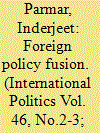

|
|
|
|
|
| Publication |
2009.
|
| Summary/Abstract |
Several tendencies in US foreign policy politics generated a new foreign policy consensus set to outlast the Bush administration. Three developments are analysed: increasing influence of conservative organizations - such as the Heritage Foundation, and of neoconservatism; and, particularly, democratic peace theory-inspired liberal interventionism. 9-11 fused those three developments, though each tendency retained its 'sphere of action': Right and Left appear to have forged an historically effective ideology of global intervention, an enduring new configuration of power. This paper analyses a key liberal interventionists' initiative - the Princeton Project on National Security - that sits at the heart of thinking among centrists, liberal and conservative alike. This paper also assesses the efficacy of the new consensus by exploring the foreign policy positions and advisers of President-elect Barack Obama and his defeated Republican rival, Senator John McCain, concluding that the new president is unlikely significantly to change US foreign policy.
|
|
|
|
|
|
|
|
|
|
|
|
|
|
|
|
| 4 |
ID:
086398
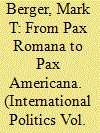

|
|
|
|
|
| Publication |
2009.
|
| Summary/Abstract |
This review paper focuses on the most recent cycle in the debate about the history and future of the 'New American Empire,' both in relation to the rise and fall of the Roman Empire specifically, and against the wider backdrop of the extensive debate about the US position in the changing global order more generally. It argues that much of the literature, including some of the books under review, rest on a misreading of history (Roman or otherwise) and a flawed grasp of the fate of the American ascendancy in relation to the contemporary crisis of the nation-state system and the far from unexpected boom-bust cycles of 'genuinely existing' liberal capitalism (globalization) in the twenty-first century. The washout on Wall Street in the latter part of 2008 could only come as a surprise to those who have not been paying attention to the vicissitudes of 'genuinely existing' liberal capitalism over the past 30 years or more. The paper argues that the American ascendancy, contrary to much of the contemporary prognostication, remains in its prime and Pax Americana will only begin a downward spiral when it has been successfully challenged and displace by an equally powerful and systemic alternative. In the meantime, the New American Empire, especially under new leadership, looks set to continue and even flourish.
|
|
|
|
|
|
|
|
|
|
|
|
|
|
|
|
| 5 |
ID:
086409


|
|
|
|
|
| Publication |
2009.
|
| Summary/Abstract |
In the aftermath of September 11, 2001 American geopolitical categories changed as the world was remapped into categories congruent with the prosecution of the global war on terror. The designation global was linked to the capabilities of the new military technologies of the revolution in military affairs in official documents that codified the Bush doctrine. The official US doctrine now explicitly states that ending tyranny on earth is the national security objective for which these new forces will be used. But a careful reading of the official 2006 Quadrennial Defense Review Report, and Thomas Barnett's popular exposition of the logic of the war on terror in The Pentagon's New Map shows that both these geographical specification of contemporary geopolitics, and the high-technology forces planned to fight the war, offer little promise that it will be successfully prosecuted. Geopolitics remains much more complicated than either contemporary policy statements or popular cartographic justifications suggest.
|
|
|
|
|
|
|
|
|
|
|
|
|
|
|
|
| 6 |
ID:
086399
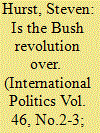

|
|
|
|
|
| Publication |
2009.
|
| Summary/Abstract |
Several observers have argued that the radical transformation of American foreign policy wrought by George W. Bush is already over. They argue that the 'Bush Revolution' was merely a result of the short-term conjuncture of neoconservative influence and the impact of September 11, 2001, and that this temporary deviation has been ended by the American failure in Iraq. Yet the causes of the Bush Revolution are more fundamental and long-term than this argument implies. It is in the combination of the shift to a militarily unipolar international system and the dominance of the Republican Party by its conservative wing that the real roots of the Bush foreign policy lie, and neither condition is likely to alter in the foreseeable future. Moreover, although the Iraq War has led to some shifts in policy, the Republicans' selection of John McCain as their presidential candidate confirms the continued vitality of the Bush Revolution.
|
|
|
|
|
|
|
|
|
|
|
|
|
|
|
|
| 7 |
ID:
086413
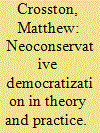

|
|
|
|
|
| Publication |
2009.
|
| Summary/Abstract |
Neoconservative democratization took on new life after 9/11: the United States should be a global guarantor of liberty, even if coercing this freedom. The justification was a hybrid of liberal democratic peace and realist national security. However, this aggressive democratization is contradictory: the philosophical foundation is insincerely decorated by liberal language that overlooks damaging compromises when ideology is put into practice. Uzbekistan, with whom a close partnership in the war against terror was developed and then was further deepened along supposedly democratic development lines, is used as a critical case study. In short, the contradictions in neoconservative ideology create flaws in policy implementation that do not create smoother paths to development, prevent democratic consolidation and weaken American security interests.
|
|
|
|
|
|
|
|
|
|
|
|
|
|
|
|
| 8 |
ID:
086412
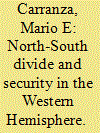

|
|
|
|
|
| Publication |
2009.
|
| Summary/Abstract |
This paper examines the economics-security nexus in US policy toward South America, and the implications for South America of the 'securitization' of US foreign economic policy during the Bush administration. There has always been a tight linkage between the US foreign economic and security agendas but the real issue is the degree of 'tightness' at a given point in time. After the Alliance for Progress lost its way the United States tended to pursue its economic and security interests in South America in separate tracks, even if preventing Soviet intrusions in the region remained in the background. Yet after the collapse of the Free Trade Area of the Americas (FTAA) negotiations in 2004 a US strategy of 'divide and conquer' through bilateral trade deals has been accompanied by a 'securitization' discourse and there are some indications that it may 'securitize' as a new threat the social movements and neopopulist regimes that oppose neoliberal economic policies. The paper discusses the limits of the securitization thesis. The conclusion examines the future of US-South American relations and argues that the United States needs to renew its commitment to genuine multilateralism and re-engage the region to establish an effective and lasting partnership for dealing with common economic and security challenges in the twenty-first century.
|
|
|
|
|
|
|
|
|
|
|
|
|
|
|
|
| 9 |
ID:
086408


|
|
|
|
|
| Publication |
2009.
|
| Summary/Abstract |
The US national security state was fashioned at the beginning of the Cold War to contain the global threat of the rival superpower, the Soviet Union. However, this security framework did not wither away with the end of the Cold War and the disintegration of the USSR. The events of September 11 starkly exposed the limitations of a state-centric approach to international security in a globalizing world. But the Bush administration falsely assumed that the traumatic events of 9/11 came out of a clear blue sky, and that a rejuvenated national security state would eventually overwhelm the 'new' threat of terrorism. The dangers of persisting in this direction were shown by the US-led invasion of Iraq. Far from closing the gap between the US approach to security and the operation environment of a post-Cold War world, Bush's war on terror undermined the international reputation of the US and presented the American taxpayer with a huge and probably unsustainable burden. All this highlighted the need for a more multilateral direction in US security policy in the post-Bush era. Such an approach would not only correspond better to the realities of today's interconnected world, but also serve as a buffer against the extension of the power of government that had been witnessed in America during the Bush years.
|
|
|
|
|
|
|
|
|
|
|
|
|
|
|
|
| 10 |
ID:
086397
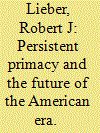

|
|
|
|
|
| Publication |
2009.
|
| Summary/Abstract |
Arguments are widely expressed that America is in decline, both at home and abroad. These admonitions extend not only to economic, diplomatic and geopolitical realms, but even to the cultural arena. The United States does face real and even serious problems, but there is an unmistakable echo of the past in current arguments. Antecedents of these views were evident in the 1970s, '80s and '90s, and on occasion even in identical language. Indeed, declinist proclamations have appeared on and off not only throughout the 20th Century, but also during the 18th and 19th Centuries. Moreover, periodic crises in US history have included challenges more daunting than those of today. It can thus be instructive to compare the arguments and prescriptions of the new declinism with those of earlier eras. The evidence suggests a pattern of over-reaction, a historicism, and a lack of appreciation for the robustness, adaptability and staying power of the United States.
|
|
|
|
|
|
|
|
|
|
|
|
|
|
|
|
|
|
|
|
|